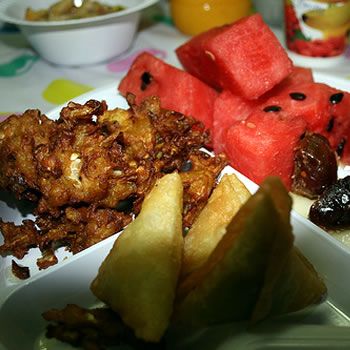The Holy month of Ramadan has a true spirit of holiness and spirituality for every Muslim. Along with this unique aspect, the month of Ramadan is also a great opportunity to bringing back a balanced and healthy life style. Through fasting one begin to learn how to manage his/her healthy eating habits, how to improve self control and disciplined one self.
It is one of the blessings of ALLAH to the Muslims that He gifted them the Holy month of Ramadan to refine their Emaan. It is a month when good deeds are multiplied and people are raised in status, when ALLAH frees many people from the fire. This is the real time and opportunity to gain ALLAH’s blessings, mercy and forgiveness by spending much of time in worships (Ibadaats).
Along with these spiritual aspects, the month of Ramadan is also a great opportunity to bringing back a balanced and healthy life style. Through fasting one begins to learn how to manage his/her healthy eating habits, how to improve self control and how to discipline one’s self.
Though the month of Ramadan teach us the discipline and regularity between our life style, health routine and eating habits, but most of the people ignore this very important aspect of Ramadan and face health problems till the whole Ramadan.
The month of Ramadan gives the lesson of simplicity also. So, simplicity not even in our life style but in our health and eating habits is also necessary to maintain good health during Ramadan.
To overcome the health concern problems, one must follow the following simple Ramadan health tips for a healthy Ramadan as a healthy person can enjoy the true fruits and the real holiness of the Ramadan.
Health tips for Ramadan:
Maintain a simple and normal diet plan: To remain healthy during Ramadan, normal quantities of food from the major food groups: bread and cereal, milk and dairy product, fish, meat and poultry, bean, vegetable and fruit should be consumed. (Vegetarians and Vegans should amend this list as appropriate). Intake of fruits after a meal is strongly suggested. In actual fact, our diet in Ramadan should not differ very much from our normal diet and should be as simple as possible.
Avoid eating too many carbohydrates: Most Iftar dinners are composed of a ton of carbohydrates. Pasta, rice, bread, sweets and sugars are the most common culprits. Try to avoid these. No, your host will not be offended. Instead of eating a ton of rice with the red sauce, try to cut the rice out totally and just have the sauce.
Have a moderate and whole some Suhoor: Suhoor or Sehri, the pre-dawn meal, should be a wholesome, moderate meal that is filling and provides enough energy for many hours. It is therefore particularly important to include slowly-digesting foods in the suhoor. Complex carbohydrates are foods that will help release energy slowly during the long hours of fasting. Complex carbohydrates are found in grains and seeds, like barley, wheat, oats, millets, semolina, beans, lentils, whole meal flour, basmati rice, etc. Eat whole wheat or oat cereal or whole wheat bread, 1-2 serving with a cup of milk. Add 2-3 teaspoons of olive oil in a salad or the cereal. Eat 1-2 servings of fruits, as a last item.
A refreshing and revitalizing Iftar: Iftar is the meal which breaks the day’s fast. This meal could include dates, following the Prophetic traditions.
Dates will provide a refreshing burst of much-needed energy. Fruit juices will also have a similar, revitalizing effect. The meal should remain a meal and not become a feast! Try to minimise the rich, special dishes that traditionally celebrate the fast.
Eat fiber-rich foods: Fiber-rich foods are also digested slowly and include bran, cereals, whole wheat, grains and seeds, potatoes with the skin, vegetables such as green beans and almost all fruit, including apricots
Drink water as much as you can: Drinking of sufficient water and juices between Iftar and sleep to avoid dehydration and for detoxification of the digestive system should be encouraged in fasting individuals.
Avoid fried foods: Fried foods, very spicy foods and foods containing too much sugar such as sweets, the delight of many, can cause health problems should be limited during Ramadan. They cause indigestion, heart-burn, and weight problems. Fasting can often increase gastric acidity levels in the stomach causing a burning feeling, heaviness in the stomach and a sour mouth. This can be overcome by eating foods rich in fiber such as whole wheat bread, vegetables, humus, beans and fruits.
These foods trigger muscular action, churning and mixing of food, breaking it into small particles, and thus help reduce the buildup of acid in the stomach.
Prote in is also must: Consuming enough protein during each of your Ramadan meals as it will keep you feeling full until the next meal, preventing you from eating too many sweets. Good sources of protein include fish, skinless chicken, lean meat cuts, and legumes (chickpeas and beans), nuts and seeds.
Do some physical activity: In addition to these eating habits, people should do some physical activity of any kind depending on their health status and preferences. Walking for thirty minutes after Iftar, for example, is recommended. Another important point is getting adequate sleep and not exceeding the needed hours.
Give enough time to Ibadaats: It is also important to follow good time management procedures for Ibadaat (prayer and other religious activities), sleep, studies, work, and physical activities or exercise. A good balance in the amount of time attributed for each activity will lead to a healthier body and mind in Ramadan.
The Holy month of Ramadan has a true spirit of holiness and spirituality for every Muslim.



